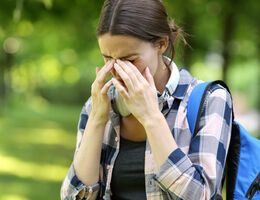Health library
Back to health libraryHow to cope with eye allergies

March 28, 2024—Spring is a time for warmer weather, new beginnings—and, for many people, allergies. The season's beautiful blooms can cause seasonal allergies to erupt. These allergies can affect your eyes, making them watery, itchy and red.
Eye allergy facts
An eye allergy happens when your eyes come into contact with something in the environment that irritates them. This irritant is called an allergen, and it usually doesn't bother most people. In the springtime, pollen is a typical outdoor allergen. Indoor allergens, which can exist year-round, include dust mites, mold and pet dander.
Your eyes respond to the allergen by releasing histamine, which produces eye allergy symptoms. These symptoms include:
- Itching.
- Burning.
- Redness.
- Clear discharge.
Some people also may experience puffy eyelids; sensitivity to bright light; and dark, under-eye circles.
Relieving the red-eye
First, avoid rubbing your eyes. This will only make your symptoms worse.
Next, avoid the things that cause allergic reactions. Try these tips from the American College of Allergy, Asthma & Immunology:
- Watch pollen counts and stay inside as much as possible on days when pollen counts are highest.
- Wear sunglasses or eyeglasses while outdoors. This can help reduce the amount of pollen that enters your eyes.
- Keep windows closed, and don’t use fans that could pull outdoor air into the house. Use air conditioning in your house and your car.
- Use mite-proof bedding materials. Wash your bed linens frequently in hot water to help rid them of dust mites.
- Keep indoor humidity low to limit mold. Use a dehumidifier, if necessary, and clean it regularly.
- Use a damp cloth and mop when cleaning surfaces and floors to limit the amount of airborne dust.
- Wash your hands after petting animals. If you are allergic to a pet in your home, try to avoid being in the room with it when possible. Don't let the pet sleep in your bedroom.
- Replace carpeting with hardwood floors, tile or linoleum. These types of floors are easier to keep dander-free.
Over-the-counter and prescription eye drops also can ease discomfort, according to the American Academy of Ophthalmology.
- Decongestant eye drops reduce redness. However, you should use them only for two or three days, or your symptoms could get worse.
- Artificial tears wash allergens out of your eyes and soothe irritation. If they don't contain preservatives, you can use them several times per day for as long as you need to.
- Antihistamine eye drops can reduce redness and itchiness.
When to see a doctor
If your eye allergy symptoms persist, ask your doctor if immunotherapy would be right for you.
Sources
- American Academy of Ophthalmology. "What Are Eye Allergies?" https://www.aao.org/eye-health/diseases/allergies.
- American College of Allergy, Asthma & Immunology. "Eye Allergy." https://acaai.org/allergies/allergic-conditions/eye-allergy/.
- American College of Allergy, Asthma, & Immunology. "Spring Allergies Attack More Than Just Your Nose." https://acaai.org/news/spring-allergies-attack-more-than-just-your-nose/.
